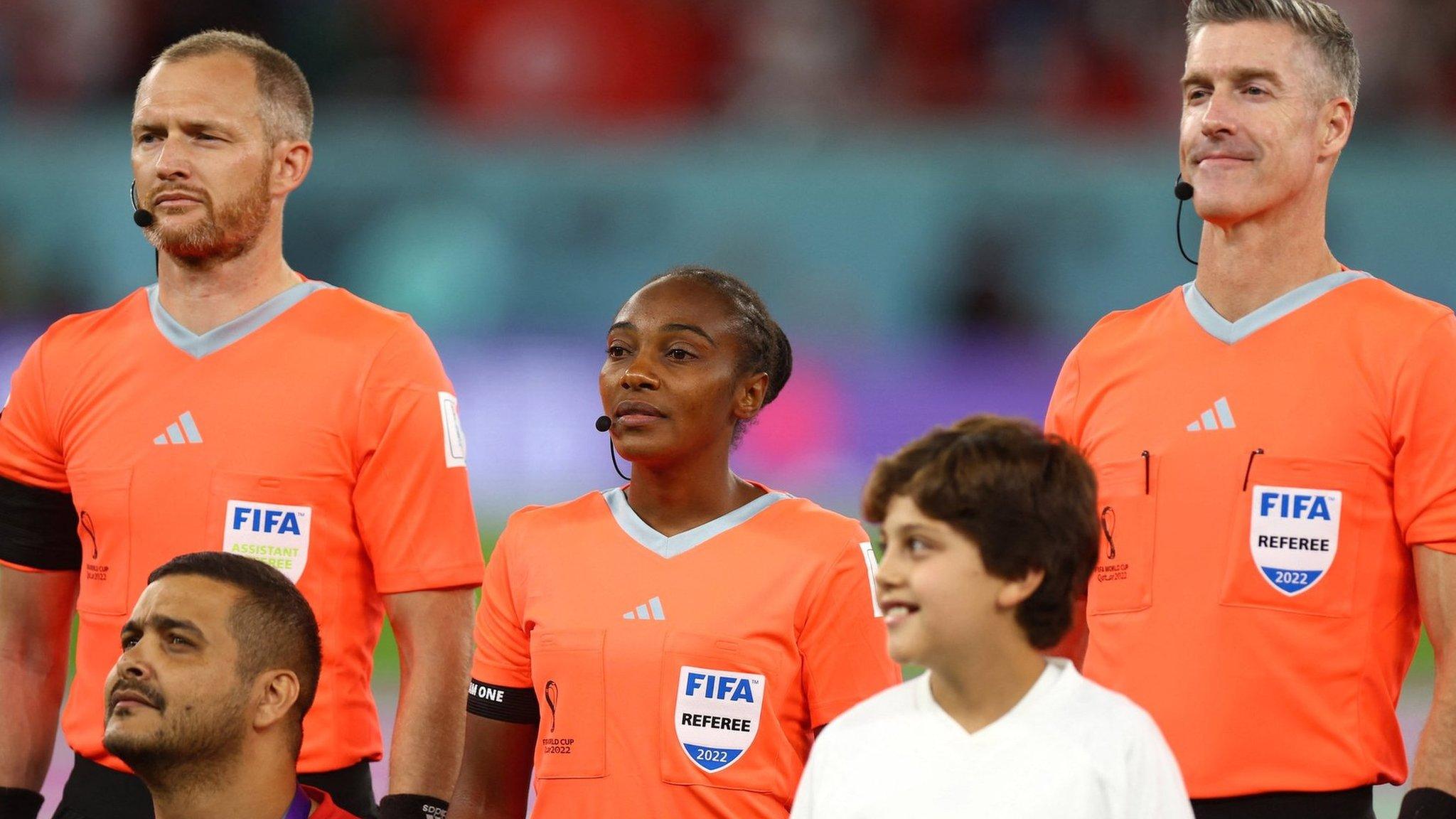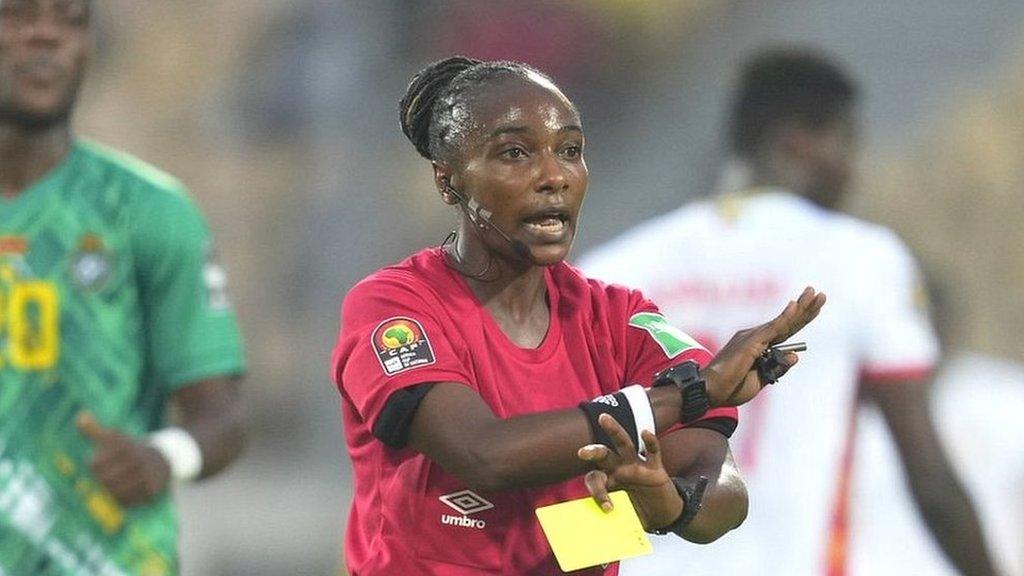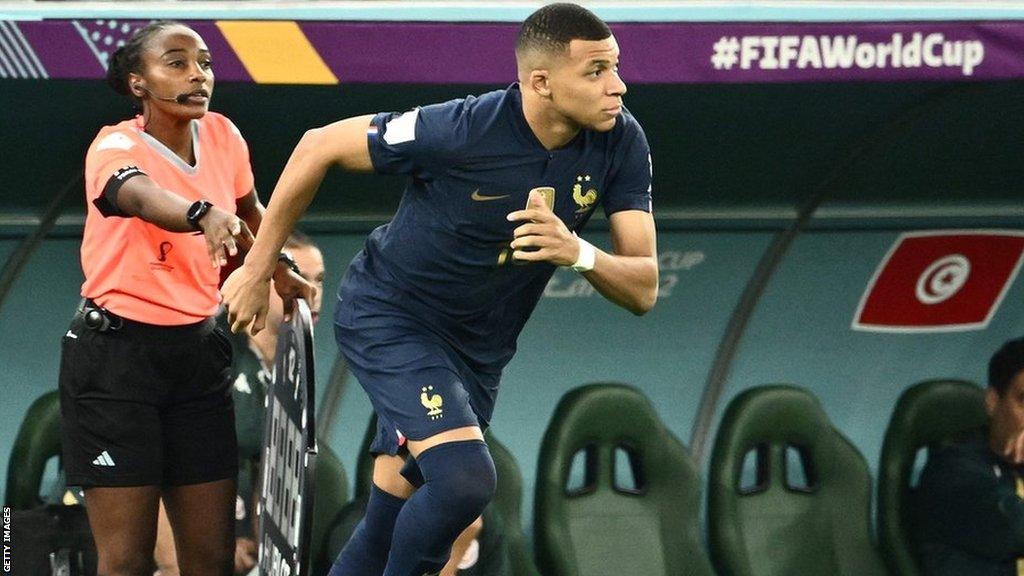Women's World Cup 2023: Referee Salima Mukansanga's tips for the top
- Published

Salima Mukansanga (centre) made history when serving as a fourth official at the men's 2022 World Cup
Salima Mukansanga is the standout name among the 12 African officials designated for the Women's World Cup.
The Rwandan is one of only six women to have officiated at a men's World Cup, which she did when serving as a fourth official in Qatar in 2022, and is the only woman to have refereed a men's Africa Cup of Nations match.
So how did a one-time basketball hopeful and vocational nurse end up as a pioneering referee instead?
Here, the 25-year-old shares some of her tips for the top.
Be proactive
As a child, Mukansanga simply wanted to play football - but with hordes of boys and girls turning out for games of what she calls "mass football", injuries were so frequent that her parents barred her from the sport.
She switched to basketball but, after failing to make Rwanda's Under-17 team, she turned her attentions to a vocation that had long called to her.
With her father having run a football team whose losses were occasionally attributed to the referee, Mukansanga was well aware of the officials' role.
"The moment I lost the opportunity with the under-17 basketball team, I started communicating with people about being a referee," she recalls, speaking to the BBC's Africa Daily podcast.
"You register with people in charge of sports in your sector, who then send it to the FA, who can then approve it.
"When I got that information, I was excited. I said, 'What I've been thinking about since childhood could now be a reality - so let me try'. Now, here I am."
Ignore conventional wisdom
On her road to refereeing at not only the men's and women's World Cup tournaments but the Olympics too, the obstacles facing Mukansanga were legion.
Among the biggest were traditional attitudes regarding her sex and religion, and the views many held at the time suggesting a woman like her should not be pursuing such a calling.
"I was born a Muslim, so for my family to see a girl wearing a shirt and playing football, they were like: 'Oh my goodness, what is this?'
"People didn't understand. Then people tended to let boys do what they wanted in sport, yet they doubted us girls.
"If you really want to reach your dream, forget what you've been told - fight, and then you can reach wherever you want to reach."

Mukansanga became the first woman to referee a men's Africa Cup of Nations match in 2021 when taking charge of Zimbabwe v Guinea in Cameroon
Persevere
As she started taking tentative steps, Mukansanga continued to meet what she describes as a "grass ceiling" because of her gender.
She did eventually officiate in Rwanda's top league, but only after continually ignoring the doubters.
"People used to say, 'we'll give you a chance in the men's second division, but to go in the first division is tough as teams will not accept a woman referee'. Then people also talked about speed and fitness, saying we would not make it.
"This is what people thought - so it was up to me to fight until being appointed to the Premier League."
Have passion for your role
Mukansanga believes she would have achieved none of her historic feats had she not loved football.
It was this bedrock of desire that kept the university graduate committed in the face of endless challenges.
"Without love and passion, tomorrow you're going to say, 'no, I'm tired, I'm going to stop' because you're going to face many obstacles, such as the fitness requirements they want, as well as them wanting women to work doubly hard as men.
"But if you say it's in your heart, you're going to make it. It's about having ambition and a goal, and this is also something else I can say - dream big."

Mukansanga is the only African woman to have officiated at a men's World Cup
Find your champions
As Mukansanga freely admits, her progress in the sport would have been far less successful without the help of some key supporters.
In recent times, these backers have included African football's ruling body, the Confederation of African Football, and Fifa, with the game's world governing body, which has repeatedly said it chooses referees on "quality, not gender". , external
Trainers from both organisations have been key to giving Mukansanga both belief and, equally crucially, a salary as a professional.
"I have people who have been to competitions of the highest level who are really motivating me. They're the people who keep pushing me [to think] that everything is possible.
"This gives me the strength and power to think about taking part in a big competition."
Think carefully
Mukansanga has a bachelor's degree in nursing and midwifery from a Rwandan university but she has rarely used her skills in a professional capacity. Refereeing has been her own personal tonic, yet she only chose the whistle over a stethoscope after considerable thought.
When asked about her strongest refereeing memories, last year's World Cup in Qatar comes first - closely followed by a trawl much further back to where her journey really began.
"Something else that keeps coming in my memory is the moment I decided to be a referee - despite people telling me, 'you're going to be wasting your time'. When I took the decision, I spent three days alone thinking about whether to be a nurse or a referee.
"I didn't make a mistake choosing to be a referee. The world is looking at me now - and the world will never forget my name."